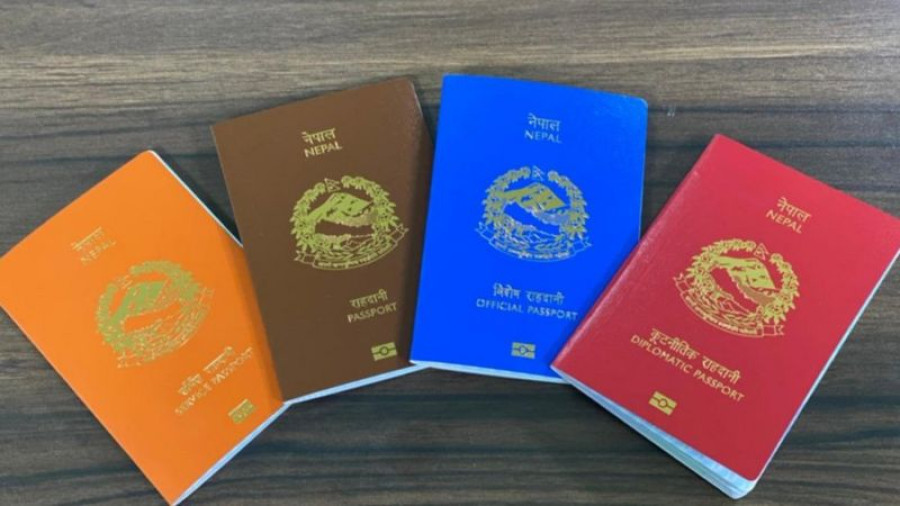National
Department refutes charges of unfair passport tender process
Several bidders alleged that the field was not level for supplying booklets and services worth Rs12 billion.
Post Report
Amid concerns by various foreign bidders that the new bidding process for passport procurement lacks fairness, the Department of Passports on Tuesday said there are arrangements for all prospective bidders.
The Department of Passports in November last year issued a public notice calling international bidders to print and supply 6.4 million e-passports (biometric) over the next five years, offering Rs 12 billion for the service. But some bidders raised concerns over the bid documents and asked the department to amend some clauses alleging that they favour the present supplier IDEMIA, the France-based company that has been supplying and printing passports in Nepal since 2010.
“We have addressed most of the concerns raised by the bidders and we are in the final stage of bid opening,” Tirtha Aryal, director general at the Department of Passports, said during a press conference on Tuesday.
“We will open the bids on February 11. Some bidders have demanded another extension for bid submission after making several changes in the bid document. Since we have a tight schedule, there won’t be another time extension.”
In its last bidding of 2020, the DoP called for a supply of two million e-passports. The France-based IDEMIA won the bid but due to several factors, the government, through a policy decision, procured more millions of passports from the same company through a negotiation process called variation order.
“It is not appropriate to procure through the variation order forever. Therefore, we prepared the bid document and announced a fresh global bidding,” said Aryal.
“But this time we have split the contract into two packages—e-MRTDs system including pre-enrollment, enrollment, data management and delivery system and e-MRTDs booklet with personalisation, quality control and packaging—to end the dependency on one firm or company.”
The department believes that splitting the tender will invite more companies to bid and it will also ensure the transfer of technical knowledge, according to Aryal.
He also admitted that there is some risk in splitting the tender for the procurement of the system and the booklets from two different companies. “However, this is a risk worth taking considering its benefits.”
At present, both packages—the system and the booklets—are provided by IDEMIA, in a process called end-to-end solution.
The new procurement could take more time—18 months to two years—but the department has enough passports to meet the demand for another year. “At present, we have 1.27 million passports in stock that can meet the demand for one year”, he said. In case the procurement is delayed, “we will go for a variation order but we are trying to meet the schedule.”
The average monthly demand for passports at present is 100,000 copies. Since the system, personalisation, and enrollment centres are in place, the new company can deliver the passports within eight months after the contract is awarded, said Aryal.
“There won’t be a ‘no passport’-like situation as we have tweaked many provisions but also given continuity to several existing provisions such as the passport features, and existing enrolment and personalisation centres. These existing provisions will cut down the delivery time of the passport copies,” said Somesh Thapa, an official at the department.
The tender process is said to have been initiated after necessary homework with relevant offices engaged in the information technology service procurement process.
While preparing the tender document, the department consulted several experts as well as agencies like the Nepal Rastra Bank, Nepal Police and the Nepal Telecommunication Authority, sought their suggestions, and formed a procurement committee, said Thapa.
“We held two pre-bid meetings and a consultation meeting and extended the deadline to submit bids by one month. Now we are not in a position to extend it again.”
In one pre-bid meeting, as many as 22 bidders were present. As per their recommendations, some changes were made to ensure the level playing field, the department stated.
Passport procurement is a complicated process and a sensitive matter, said Aryal. “There is no malpractice in the procurement process.”
Both Aryal and Thapa said at the press conference that all the personalised data of service seekers are secure and within the reach of the department’s engineers. “There is no issue of data migration and no one can access the data from outside the country,” said Aryal.




 12.12°C Kathmandu
12.12°C Kathmandu













